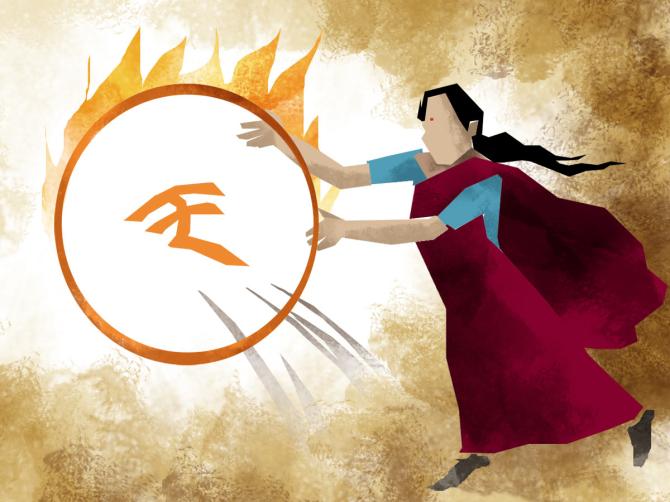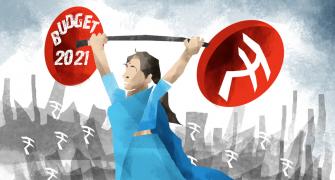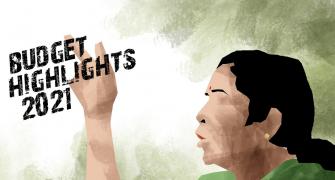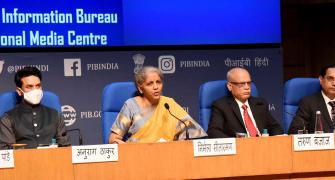That's a big change that was made possible due to corporate tax cuts.
Corporation tax collection in FY22 will be lower than even the FY18 levels, reports Abhishek Waghmare.

Budget 2021 plans to spend a staggering Rs 11.7 trillion in only three months till March, a record of sorts and taking total spending to Rs 34.5 trillion in FY21.
That’s a 28 per cent boost over the previous year.
Expenditure in FY22 is, however, expected to remain flat.
If spent on the said lines, the Budget’s size with respect to India’s gross domestic product will increase -- a welcome sign (chart below).

Most of this fiscal expansion will be funded by borrowing, taking the fiscal deficit to 9.5 per cent of GDP this year, and to 6.8 per cent in FY22.
The borrowing next year would be higher than the 2009-10 fiscal stimulus, which was 6.4 per of GDP.
The government has planned for a revenue deficit of more than Rs 11 trillion, at 5.1 per cent of GDP (chart below).

But this enhanced spending comes with a spectre of rising spending on committed heads.
Heavy borrowing for two years will compel the government to pay hefty interest payments till debt maturity.
Subsidies are set to rise too, and only four non-discretionary spend items could account for 7.5 per cent of GDP in FY22 (chart below).

Having said that, the government has set aside a sizeable amount for vaccination this year, but its contribution towards pushing health expenditure to 2.5 per cent of GDP may not rise much (chart below).

Looking at the broad heads of spending, the government has increased its thrust on schemes where it is the sole financier -- rural oriented schemes such as cash support and food subsidies—and the resources that go to states, or are spent in coordination with states (centrally sponsored schemes), have been reduced (chart below).

The share of defence spending in total expenditure is also falling (chart below).

Taxes on individual incomes will now bring more revenue to the government than taxes on corporate profits, a big change that was made possible due to corporate tax cuts.
Corporation tax collection in FY22 will be lower than even the FY18 levels (chart below).

Changing the structure of excise duties by introducing new cess will shrink the divisible pool of taxes, at the cost of states’ share.
GST revenue is expected to grow 23 per cent in FY22, and its current growth trajectory could be the reason for this optimism (chart below).

The Budget just rolled over its commitments for disinvestment, and pared down its expectations from dividends, spectrum sales and other non-tax revenue sources (chart below).










